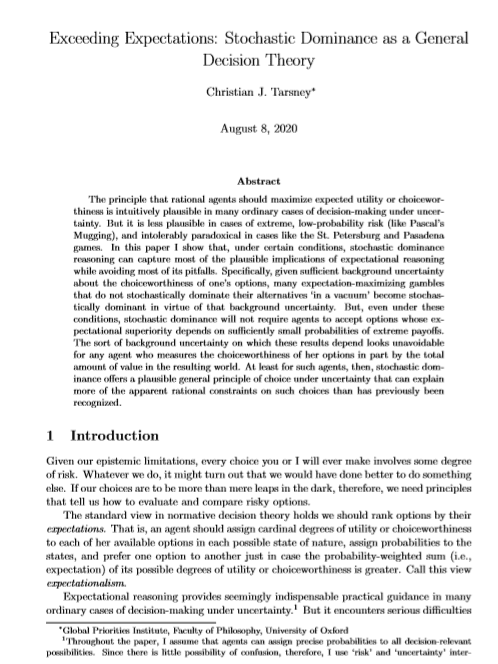Exceeding expectations: stochastic dominance as a general decision theory
Christian Tarsney (Global Priorities Institute, Oxford University)
GPI Working Paper No. 3-2020
The principle that rational agents should maximize expected utility or choiceworthiness is intuitively plausible in many ordinary cases of decision-making under uncertainty. But it is less plausible in cases of extreme, low-probability risk (like Pascal’s Mugging), and intolerably paradoxical in cases like the St. Petersburg and Pasadena games. In this paper I show that, under certain conditions, stochastic dominance reasoning can capture most of the plausible implications of expectational reasoning while avoiding most of its pitfalls. Specifically, given sufficient background uncertainty about the choiceworthiness of one’s options, many expectation-maximizing gambles that do not stochastically dominate their alternatives ‘in a vacuum’ become stochastically dominant in virtue of that background uncertainty. But, even under these conditions, stochastic dominance will not require agents to accept options whose expectational superiority depends on sufficiently small probabilities of extreme payoffs. The sort of background uncertainty on which these results depend looks unavoidable for any agent who measures the choiceworthiness of her options in part by the total amount of value in the resulting world. At least for such agents, then, stochastic dominance offers a plausible general principle of choice under uncertainty that can explain more of the apparent rational constraints on such choices than has previously been recognized.
Other working papers
Population ethical intuitions – Lucius Caviola (Harvard University) et al.
Is humanity’s existence worthwhile? If so, where should the human species be headed in the future? In part, the answers to these questions require us to morally evaluate the (potential) human population in terms of its size and aggregate welfare. This assessment lies at the heart of population ethics. Our investigation across nine experiments (N = 5776) aimed to answer three questions about how people aggregate welfare across individuals: (1) Do they weigh happiness and suffering symmetrically…
Population ethics with thresholds – Walter Bossert (University of Montreal), Susumu Cato (University of Tokyo) and Kohei Kamaga (Sophia University)
We propose a new class of social quasi-orderings in a variable-population setting. In order to declare one utility distribution at least as good as another, the critical-level utilitarian value of the former must reach or surpass the value of the latter. For each possible absolute value of the difference between the population sizes of two distributions to be compared, we specify a non-negative threshold level and a threshold inequality. This inequality indicates whether the corresponding threshold level must be reached or surpassed in…
In defence of fanaticism – Hayden Wilkinson (Australian National University)
Consider a decision between: 1) a certainty of a moderately good outcome, such as one additional life saved; 2) a lottery which probably gives a worse outcome, but has a tiny probability of a far better outcome (perhaps trillions of blissful lives created). Which is morally better? Expected value theory (with a plausible axiology) judges (2) as better, no matter how tiny its probability of success. But this seems fanatical. So we may be tempted to abandon expected value theory…

